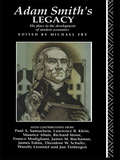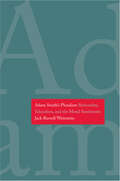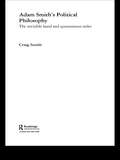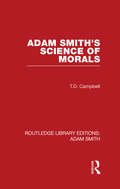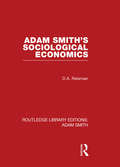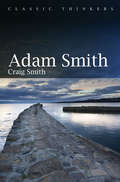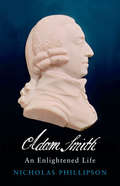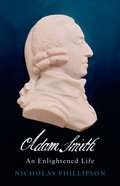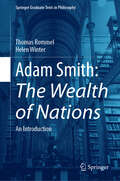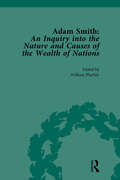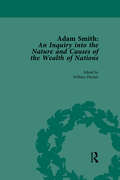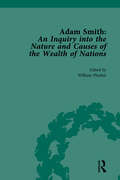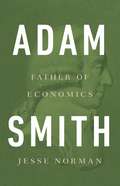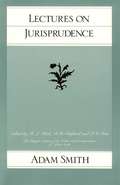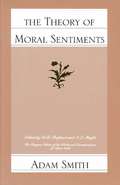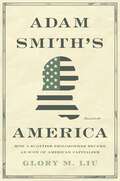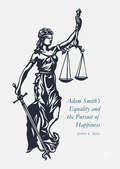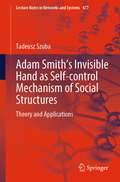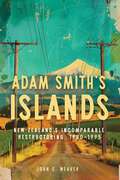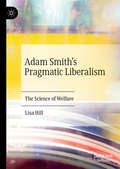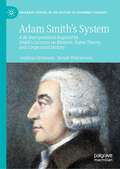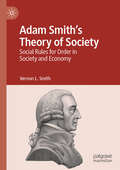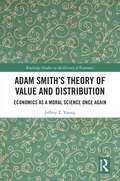- Table View
- List View
Adam Smith's Legacy: His Place in the Development of Modern Economics
by Michael FryFirst published in 1992. Routledge is an imprint of Taylor & Francis, an informa company.
Adam Smith's Pluralism
by Jack Russell WeinsteinIn this thought-provoking study, Jack Russell Weinstein suggests the foundations of liberalism can be found in the writings of Adam Smith (1723#150;1790), a pioneer of modern economic theory and a major figure in the Scottish Enlightenment. While offering an interpretive methodology for approaching Smith's two major works, The Theory of Moral Sentiments and The Wealth of Nations, Weinstein argues against the libertarian interpretation of Smith, emphasizing his philosophies of education and rationality. Weinstein also demonstrates that Smith should be recognized for a prescient theory of pluralism that prefigures current theories of cultural diversity.
Adam Smith's Political Philosophy: The Invisible Hand and Spontaneous Order (Routledge Studies in Social and Political Thought #Vol. 42)
by Craig SmithWhen Adam Smith published his celebrated writings on economics and moral philosophy he famously referred to the operation of an 'invisible hand'. Adam Smith’s Political Philosophy makes visible this hand by examining its significance in Smith’s political philosophy and relating it to similar concepts used by other philosophers, thus revealing a distinctive approach to social theory that stresses the importance of the unintended consequences of human action. The first book to examine the history of Smith’s political philosophy from this perspective, this work introduces greater conceptual clarity to the discussion of the invisible hand and the related notion of unintended order in the work of Smith, as well as in political theory more generally. By examining the application of spontaneous order ideas in the work of Smith, Hume, Hayek and Popper, this important volume traces similarities in approach, and from these constructs a conceptual, composite model of an invisible hand argument. While setting out a clear framework of the idea of spontaneous order, the book also builds the case for using this as an explanatory social theory, with chapters on its application in the fields of science, moral philosophy, law and government.
Adam Smith's Science of Morals (Routledge Library Editions: Adam Smith)
by Tom CampbellThis critical exposition of Adam Smith’s Theory of Moral Sentiments, first published in 1971, gives an appreciation of Smith’s conception of scientific method as applied to the study of social phenomena. The work is placed in the context of Smith’s other writings including of course The Wealth of Nations, but making special use of the theory of scientific development contained in his posthumous work, Essays on Philosophical Subjects. By concentrating on Smith’s methodological approach to the study of society, this book provides an illuminating interpretation of his moral theory and defends it against any mistaken criticisms. It also includes a much needed analysis of the important differences between Smith’s ‘impartial spectator’ and the ‘ideal observer’ of modern ethical society. The result is a pointed study, bringing out the close connection between his moral, legal and ethical theories, which will be welcomed by all students of 18th century thought, specialists in moral theory, and the interested lay-reader.
Adam Smith's Sociological Economics (Routledge Library Editions: Adam Smith)
by David Alexander ReismanFirst published in 1976, this book provides an interdiciplinary study fo the thoughts of Adam Smith, showing it particular how the link between economic basis and social superstructure was central to his work. The work is split into six sections, dividing Smith's views along the following lines: 'methology', 'conduct and character', 'consumer behaviour', 'the upper classes', 'the lower classes', and finally 'the State'.
Adam Smith: A Primer (Classic Thinkers)
by Craig SmithAlmost everyone has heard of Adam Smith, founding father of modern economics and author of Wealth of Nations. There is, however, much more to him than this. This new introduction gives a crystal clear overview of the entirety of Smith’s thought. It demonstrates how Smith’s economic theories fit into a larger system of thought that encompasses moral philosophy, philosophy of science, legal and political theory, and aesthetics. Examining the central arguments of his major works, ranging from The Theory of Moral Sentiments to his lectures on jurisprudence and beyond, Smith’s thought is explained in its full intellectual and historical context. As the book unfolds, the long-standing caricature of Adam Smith as an uncritical defender of capitalism red in tooth and claw is systematically challenged, revealing a far more complex and nuanced figure whose rich legacy remains highly relevant today. Comprehensive yet concise, this book will be the leading introduction to Adam Smith’s ideas for generations of students, scholars and general readers, relevant to areas ranging from philosophy and the history of economic thought to political theory.
Adam Smith: An Enlightened Life
by Nicholas Phillipson'The Smith who emerges from this thoughtful study is not the modern caricature. He is, rather, a man of his times, steeped in Enlightenment culture . . . he had an intellect of extraordinary brilliance, and it is the life of that intellect that is finely portrayed in this book' Noel Malcolm, Sunday Telegraph Adam Smith is celebrated as the author of the Wealth of Nations And The founder of modern economics. Yet Smith saw himself primarily as a philosopher rather than an economist, whose life's work was to establish a grand 'Science of Man', which was unfinished on his death and was one of the greatest projects of the European Enlightenment. Providing a radical new account of Smith's life And The intellectual ferment that gave rise to his ideas, this is a surprising and compelling portrait of one of the greatest minds of his age. 'A wonderful, thought-provoking book' Robert Skidelsky'A great achievement . . . Few books have shed better light on what Smith 'meant' and why he wrote as he did . . . it also sets out a richly informed account of the intellectual life in Scotland, London And The Continent at the time' Bill Jamieson, Scotland on Sunday 'Shows Smith was not the apostle of selfishness he is often misunderstood to be . . . Phillipson has portrayed an Adam Smith for our times' Diane Coyle, New Statesman
Adam Smith: An Enlightened Life
by Nicholas PhillipsonAdam Smith is celebrated all over the world as the author of The Wealth of Nations and the founder of modern economics. A few of his ideas - that of the 'Invisible Hand' of the market and that 'It is not from the benevolence of the butcher, the brewer, or the baker that we expect our dinner, but from their regard to their own interest' - have become icons of the modern world. Yet Smith saw himself primarily as a philosopher rather than an economist, and would never have predicted that the ideas for which he is now best known were his most important. This book, by one of the leading scholars of the Scottish Enlightenment, shows the extent to which The Wealth of Nations and Smith's other great work, The Theory of Moral Sentiments, were part of a larger scheme to establish a grand 'Science of Man', one of the most ambitious projects of the European Enlightenment, which was to encompass law, history and aesthetics as well as economics and ethics.Nicholas Phillipson reconstructs Smith's intellectual ancestry and formation, of which he gives a radically new and convincing account. He shows what Smith took from, and what he gave to, the rapidly changing and subtly different intellectual and commercial cultures of Glasgow and Edinburgh as they entered the great years of the Scottish Enlightenment. Above all he explains how far Smith's ideas developed in dialogue with those of his closest friend, the other titan of the age, David Hume. This superb biography is now the one book which anyone interested in the founder of economics must read.
Adam Smith: An Introduction (Springer Graduate Texts in Philosophy)
by Helen Winter Thomas RommelThis textbook provides an accessible introduction to Adam Smith, one of the most important economic thinkers. His seminal work The Wealth of Nations is a classic text in philosophy, social sciences and economics. This introduction puts Smith&’s central ideas on the division of labour, the invisible hand and the market into context. A careful analysis of key passages from Smith&’s writings explains how he arrived at a theory of society and the market that has become central to our understanding of human motives. The discussion of Smith&’s The Wealth of Nations is followed by sources from the 18th century that shaped Smith&’s analysis of human motives and propensities. This introduction is indispensable reading for an informed discussion of the mechanisms that govern human society. It provides an introduction to Adam Smith as one of the most astute thinkers of the 18th century, whose ideas shape modern concepts of the market, making it ideal as course material in courses such as economics, history, political sciences, sociology, literary studies, philosophy.
Adam Smith: Edited by William Playfair
by William Playfair William Rees-MoggFirst published in 1776, The Wealth of Nations is one of the great works of economic thought and a touchstone that has influenced generations of economists across the intervening centuries. The 1805 Playfair edition that is presented in this volume represents the first and most important early critical edition. Praised by Francis Ysidro Edgeworth for its 'acute criticism', the Playfair edition was the first to apply economic history to Smith's economic theory — raising issues which are still important in light of the 225 years of revolutions and inflations that have occurred since his death.The period between the original publication and 1805 saw an enormous development in Britain's wealth, the French Revolution, and rapid American and French inflation. William Playfair wrote insightful supplementary chapters and notes to discuss the aspects of these upheavals which he thought Smith would have wanted to address had he lived to see their effects. The edition reproduces the exact text from the corrected and expanded 1784 third edition, including the index, with Playfair's chapters and notes marked clearly as supplementary additions.
Adam Smith: Edited by William Playfair
by William Playfair William Rees-MoggFirst published in 1776, The Wealth of Nations is one of the great works of economic thought and a touchstone that has influenced generations of economists across the intervening centuries. The 1805 Playfair edition that is presented in this volume represents the first and most important early critical edition. Praised by Francis Ysidro Edgeworth for its 'acute criticism', the Playfair edition was the first to apply economic history to Smith's economic theory — raising issues which are still important in light of the 225 years of revolutions and inflations that have occurred since his death.The period between the original publication and 1805 saw an enormous development in Britain's wealth, the French Revolution, and rapid American and French inflation. William Playfair wrote insightful supplementary chapters and notes to discuss the aspects of these upheavals which he thought Smith would have wanted to address had he lived to see their effects. The edition reproduces the exact text from the corrected and expanded 1784 third edition, including the index, with Playfair's chapters and notes marked clearly as supplementary additions.
Adam Smith: Edited by William Playfair
by William PlayfairFirst published in 1776, The Wealth of Nations is one of the great works of economic thought and a touchstone that has influenced generations of economists across the intervening centuries. The 1805 Playfair edition that is presented in this volume represents the first and most important early critical edition. Praised by Francis Ysidro Edgeworth for its 'acute criticism', the Playfair edition was the first to apply economic history to Smith's economic theory — raising issues which are still important in light of the 225 years of revolutions and inflations that have occurred since his death.The period between the original publication and 1805 saw an enormous development in Britain's wealth, the French Revolution, and rapid American and French inflation. William Playfair wrote insightful supplementary chapters and notes to discuss the aspects of these upheavals which he thought Smith would have wanted to address had he lived to see their effects. The edition reproduces the exact text from the corrected and expanded 1784 third edition, including the index, with Playfair's chapters and notes marked clearly as supplementary additions.
Adam Smith: Father of Economics
by Jesse NormanA dazzlingly original account of the life and thought of Adam Smith, the greatest economist of all time Adam Smith (1723-1790) is now widely regarded as the greatest economist of all time. But what he really thought, and the implications of his ideas, remain fiercely contested. Was he an eloquent advocate of capitalism and individual freedom? A prime mover of "market fundamentalism"? An apologist for human selfishness? Or something else entirely? In Adam Smith, political philosopher Jesse Norman dispels the myths and caricatures, and provides a far more complex portrait of the man. Offering a highly engaging account of Smith's life and times, Norman explores his work as a whole and traces his influence over two centuries to the present day. Finally, he shows how a proper understanding of Smith can help us address the problems of modern capitalism. The Smith who emerges from this book is not only the greatest of all economists but a pioneering theorist of moral philosophy, culture, and society.
Adam Smith: Lectures on Jurisprudence
by Adam Smith D. D. Raphael R. L. Meek P. G. SteinSmith's Lectures on Jurisprudence, originally delivered at the University of Glasgow in 1762-1763, present his "theory of the rules by which civil government ought to be directed. " The chief purpose of government, according to Smith, is to preserve justice; and "the object of justice is security from injury. " The state must protect the individual's right to his person, property, reputation, and social relations. Building on his Theory of Moral Sentiments, Smith argues that the state must act as an impartial spectator, judging when an individual has been injured. The state must then design and apply civil and criminal laws to prevent further injuries and punish transgressors. Laws are also the means by which the state promotes public prosperity. Thus, regulations concerning trade, commerce, and production must be crafted so as to encourage rather than interfere with our productive capacities.
Adam Smith: The Adam Smith Review, Volume 5: Essays Commemorating The 250th Anniversary Of The Theory Of Moral Sentiments (The Routledge Philosophers #5)
by Samuel FleischackerAdam Smith (1723–1790) is widely regarded as one of the great thinkers of the Enlightenment period. Best-known for his founding work of economics, The Wealth of Nations, Smith engaged equally with the nature of morality in his Theory of Moral Sentiments. He also gave lectures on literature and jurisprudence, and wrote papers on art and science. In this outstanding philosophical introduction Samuel Fleischacker argues that Smith is a superb example of the broadly curious thinkers who flourished in the Enlightenment—for whom morality, politics, law, and economics were just a few of the many fascinating subjects that could be illuminated by naturalistic modes of investigation. After a helpful overview of his life and work, Fleischacker examines the full range of Smith’s thought, on such subjects as: epistemology, philosophy of science, and aesthetics the nature of sympathy moral approval and moral judgement virtue religion justice and jurisprudence governmental policy economic principles liberalism. Including chapter summaries, suggestions for further reading, and a glossary, Adam Smith is essential reading for those studying ethics, political philosophy, the history of philosophy, and the Enlightenment, as well as those reading Smith in related disciplines such as economics, law, and religion.
Adam Smith: The Theory of Moral Sentiments
by Adam Smith D. D. Raphael A. L. MacfieMan's moral nature is influenced by sentiment and sympathy. The human ability to sympathize forms the psychological basis of man's desire to adhere to natural moral laws. Adam Smith explores ideas about individual freedom and self-interest, conscience and virtue, and a classic work of moral philosophy that remains relevant.
Adam Smith’s America: How a Scottish Philosopher Became an Icon of American Capitalism
by Glory M. LiuThe unlikely story of how Americans canonized Adam Smith as the patron saint of free marketsOriginally published in 1776, Adam Smith&’s The Wealth of Nations was lauded by America&’s founders as a landmark work of Enlightenment thinking about national wealth, statecraft, and moral virtue. Today, Smith is one of the most influential icons of economic thought in America. Glory Liu traces how generations of Americans have read, reinterpreted, and weaponized Smith&’s ideas, revealing how his popular image as a champion of American-style capitalism and free markets is a historical invention.Drawing on a trove of illuminating archival materials, Liu tells the story of how an unassuming Scottish philosopher captured the American imagination and played a leading role in shaping American economic and political ideas. She shows how Smith became known as the father of political economy in the nineteenth century and was firmly associated with free trade, and how, in the aftermath of the Great Depression, the Chicago School of Economics transformed him into the preeminent theorist of self-interest and the miracle of free markets. Liu explores how a new generation of political theorists and public intellectuals has sought to recover Smith&’s original intentions and restore his reputation as a moral philosopher.Charting the enduring fascination that this humble philosopher from Scotland has held for American readers over more than two centuries, Adam Smith&’s America shows how Smith continues to be a vehicle for articulating perennial moral and political anxieties about modern capitalism.
Adam Smith’s Equality and the Pursuit of Happiness
by John E. HillThis book examines Adam Smith's main principles in Wealth of Nations as the basis for effective policymaking. Adam Smith wanted to increase happiness through this formula for a good life: equality, liberty, and justice. Free market interpretations of Smith, the book argues, grossly misrepresent his thought, emphasizing only liberty and not also equality and justice. This book suggests policies that combine all three in order for happiness to be maximized.
Adam Smith’s Invisible Hand as Self-control Mechanism of Social Structures: Theory and Applications (Lecture Notes in Networks and Systems #477)
by Tadeusz SzubaThis book shows how such a computational process functions, how great is its power and versatility, since it is possible to show how discoveries are made. In 1759, A. Smith realized that there must exist an additional powerful control mechanism behind Great Britain’s authority and government, explaining the extraordinary successes of Great Britain. He called this the Invisible Hand. Despite having used this term only 3 times, the idea evokes extreme scientific and political emotions to this day. If we apply a molecular model of computation, such as in in Adleman’s DNA computer, a computational model for the Invisible Hand can be built to show how it affects a society. It is a spontaneous, unconscious, distributed, noncontinuous computational process on the platform of minds of, e.g., people or ants. Knowing this mechanism, a future self-steering and self-optimization system for AI robot teams can be proposed, e.g., for construction sites and rescue operations.
Adam Smith’s Islands: New Zealand’s Incomparable Restructuring, 1980–1995
by John C. WeaverMany developed countries restructured relations between state and economy from the late 1970s into the 1990s. Among them, New Zealand went far, fast, and left a clear trail, making it possible to study economic restructuring as it occurred, with all the debates, uncertainty, surprises, mistakes, and accomplishments this entailed. Adam Smith’s Islands reveals the inside life of a government determined to revolutionize its nation’s politics and economy.While the 1980s economic restructuring of members of the Organisation for Economic Co-operation and Development and former Warsaw Pact countries can seem like a foregone conclusion from the vantage point of the twenty-first century, John Weaver examines how local and global institutions had to come together to implement social adjustments in New Zealand. Mounting evidence that the state had not functioned as an effective manager split the business community and primary producers between defenders of subsidization and free-market insurgents. Reforms undertaken by the governing Labour Party included abandoning currency controls, privatizing state-run businesses, ending a multitude of open and disguised subsidies, tightening fiscal responsibility, and reforming taxation. Adam Smith’s Islands focuses on the verifiable: direct primary sources from dozens of state collections and deposits of personal papers. The archival cornucopia informing this history supports a narrative that has little in common with intellectual histories of neoliberalism. To understand how the relationship between the economy and the state changed, we need to grasp how and why core institutions, practices, and cultural beliefs shed some of their once potent legitimacy.Through the lens of New Zealand, Adam Smith’s Islands examines larger questions about policy dilemmas, the global flow of capital, and the sustainability of social adjustments in economic restructuring. In so doing, it casts new light on the formation and history of what is casually labelled today as the neoliberal state.
Adam Smith’s Moral Sentiments in Vanity Fair: Lessons in Business Ethics from Becky Sharp (Issues in Business Ethics #49)
by Rosa SlegersAccording to Adam Smith, vanity is a vice that contains a promise: a vain person is much more likely than a person with low self-esteem to accomplish great things. Problematic as it may be from a moral perspective, vanity makes a person more likely to succeed in business, politics and other public pursuits. “The great secret of education,” Smith writes, “is to direct vanity to proper objects:” this peculiar vice can serve as a stepping-stone to virtue. How can this transformation be accomplished and what might go wrong along the way? What exactly is vanity and how does it factor into our personal and professional lives, for better and for worse?This book brings Smith’s Theory of Moral Sentiments into conversation with William Makepeace Thackeray’s Vanity Fair to offer an analysis of vanity and the objects (proper and otherwise) to which it may be directed. Leading the way through the literary case study presented here is Becky Sharp, the ambitious and cunning protagonist of Thackeray’s novel. Becky is joined by a number of other 19th Century literary heroines – drawn from the novels of Jane Austen, Charlotte Brontë and George Eliot – whose feminine (and feminist) perspectives complement Smith’s astute observations and complicate his account of vanity. The fictional characters featured in this volume enrich and deepen our understanding of Smith’s work and disclose parts of our own experience in a fresh way, revealing the dark and at times ridiculous aspects of life in Vanity Fair, today as in the past.
Adam Smith’s Pragmatic Liberalism: The Science of Welfare
by Lisa HillAdam Smith is commonly conceived as either an economist or a moral philosopher so his importance as a political thinker has been somewhat neglected and, at times, even denied. This book reveals the integrated, deeply political project that lies at the heart of Smith’s thought, showing both the breadth and novelty of Smith’s approach to political thought. A key argument running through the book is that attempts to locate Smith on the left-right spectrum (however that was interpreted in the eighteenth century) are mistaken: his position was ultimately dictated by his social scientific and economic thought rather than by ideology or principle. Through examining Smith’s political interests and positions, this book reveals that apparent tensions in Smith's thought are generally a function of his willingness to abandon, not only proto-liberal principles, but even the principles of his own social science when the achievement of good outcomes was at stake. Despite the common perception, negative liberty was not the be-all and end-all for Smith; rather, welfare was his main concern and he should therefore be understood as a thinker just as interested in what we would now call positive liberty. The book will uniquely show that Smith’s approach was basically coherent, not muddled, ad hoc, or ‘full of slips’; in other words, that it is a system unified by his social science and his practical desire to maximise welfare.
Adam Smith’s System: A Re-Interpretation Inspired by Smith's Lectures on Rhetoric, Game Theory, and Conjectural History (Palgrave Studies in the History of Economic Thought)
by Andreas Ortmann Benoît WalraevensInspired by his lectures on rhetoric and by game theory, this book provides a new interpretation of Adam Smith’s system of thought. It highlights its coherence through the identification of three reasoning routines and a meta-reasoning routine throughout his work on languages, rhetoric, moral sentiments, self-command, and the nature and causes of the wealth of nations. The identification of these reasoning routines allows the authors to uncover a hitherto poorly understood deep structure of Smith’s work and to explain its main characteristics. How these routines emerged in Smith’s early research on the principles of the human mind is also traced. This book sheds new light on Adam Smith and his work, highlighting his sophisticated understanding of strategic interaction in all things rhetorical, moral, and economic. It will be relevant to students and researchers interested in the history of ideas, the history of economic thought, game theory, Enlightenment studies, and rhetoric.
Adam Smith’s Theory of Society: Social Rules for Order in Society and Economy
by Vernon L. SmithMany people are intrigued by the theories of Adam Smith, particularly those found within The Theory of Moral Sentiments (TMS). The ideas in his 18th-century manuscript are abstract, dense, and philosophical. Consequently, the insights from Adam Smith can be inaccessible to those who seek to understand these teachings. This book by Vernon L. Smith clarifies and contextualizes Adam Smith's work, making it more approachable for modern readers. It provides over 400 key passages from the Douglas Stewart edition (Henry G. Bohn) of TMS, presenting these ideas with modern context from Vernon L. Smith in a clear and concise manner. The book is structured to allow readers to explore one or two passages a day, providing a gradual and thorough understanding of the ideas that influence societal order and moral foundations. Readers will gain a comprehensive understanding of Adam Smith's insights into societal order and human interaction. The book offers practical context to the 18th-century text, making it relevant for contemporary audiences, including economists, social scientists, and philosophers. By breaking down complex teachings into manageable daily readings, the book equips readers with the knowledge to appreciate and apply Adam Smith's theories in their own lives and professional fields.
Adam Smith’s Theory of Value and Distribution: Economics as a Moral Science Once Again (Routledge Studies in the History of Economics)
by Jeffrey T. YoungEver since the time of his early interpreters, beginning with David Hume, Adam Smith’s theory of value has been the subject of confusion and misunderstanding – including a controversy which still rages over whether Smith held a labour theory of value, and, if so, whether he held to it throughout Wealth of Nations, or if it was confined to the “Early and Rude State”? This book provides a close reading of Smith’s key text, and also incorporates material from the other parts of Smith’s oeuvre, especially from The Theory of Moral Sentiments, to yield original and important insights into Smith’s theory of value. The book operates on the assumption that Smith is proposing relatively simple ideas about price and takes a conventional view that simple Supply and Demand models can illuminate, clearly and consistently with his text, his theory of price. Combining these elements, the book argues that, contra Marx, Smith does not have a labour theory of value at all, understood as a theory of the determination of the relative price structure. Instead, Smith is placed squarely in the supply and demand, general equilibrium framework and the claim that he is part of a “surplus tradition”, which receives its highest treatment in the work of Piero Sraffa, is refuted. This book will be of particular interest to Adam Smith specialists, historians of economic thought, and research economists who have an interest in Smith.
